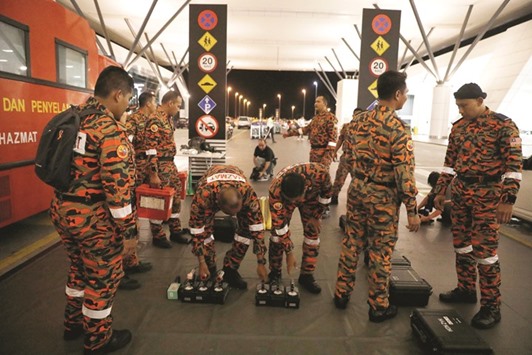Kim Jong-nam was murdered on February 13 at the budget terminal of Kuala Lumpur’s main airport with VX nerve agent, a chemical classified by the United Nations as a weapon of mass destruction.
The police forensic team, fire department and the Atomic Energy Licensing Board will be conducting the sweep at the airport, Malaysian cops said in a statement on Saturday.
The sweep will be conducted from 1am on February 26, the police said.
The airport terminal will not be closed, but the search areas would be cordoned off, a police official told Reuters.
VX is one of the deadliest chemical weapons created by man: just 10mg of the nerve agent or a single drop is enough to kill in minutes, experts have said.
Kim Jong-nam was waiting at the departure hall when he was attacked by two women who splashed his face with the liquid.He died en route to hospital.
Malaysian police on Friday said one of the women had suffered from the effects of VX and had been vomiting.
The two women — one Indonesian and one Vietnamese — have been detained, along with a North Korean man.
Seven other North Koreans have been named as suspects or are wanted for questioning.
Malaysian police are also sweeping other locations in Kuala Lumpur the suspects may have visited.
Selangor state police chief Abdul Samah Mat said earlier yesterday authorities raided an apartment in an upscale Kuala Lumpur suburb earlier this week in connection with the killing, and were checking for any traces of chemicals in the apartment.
Samah also said 44-year-old Hyon Kwang-song, a second secretary at the North Korean embassy in Kuala Lumpur, wanted for questioning in the murder has yet to come forward.
He is one of the seven North Koreans wanted in connection with the case.
“Reasonable” time will be given for the diplomat to come forward before police take further action, Samah said, adding that if the diplomat did not co-operate, the police would issue a notice under Malaysian law, compelling him to appear before the investigation team.
“And if he failed to turn up upon given this notice, then we will go to the next step by getting a warrant of arrest from the court,” he told reporters.
It was unclear if the embassy official can be detained since police have said he has diplomatic immunity.
Four others are believed to have fled to North Korea, while two are still in Malaysia.
The whereabouts of another North Korean, Ri Ji U, are unknown, Samah said.
Meanwhile, Indonesian embassy officials on Saturday met with their national Siti Aishah — one of the suspects detained in connection with the murder — for the first time since her arrest.
Aishah told embassy officials that she believed she was part of a reality television show when she lunged at Kim Jong-nam at the airport with what she believed was baby oil.
She said she had been paid 400 Malaysian ringgit ($90.15) to participate in the act.
“She only said in general that somebody asked her to do this activity...
She said she was given a kind of oil, like baby oil,” Indonesian deputy ambassador Andreano Erwin told reporters after meeting Aishah.
She will be detained until March 1, after which police will decide whether to prosecute or release her, Erwin said.
Malaysian police have said the two women had rehearsed the attack before carrying it out and had been instructed to wash their hands afterwards.
The Vietnamese woman arrested as a suspect in killing the half-brother of North Korea’s leader thought she was taking part in a prank video, Vietnam’s foreign ministry said yesterday.
Hanoi had not previously confirmed that Doan Thi Huong was Vietnamese, saying only that it was in touch with authorities in Malaysia, where Kim Jong-nam was murdered on February 13.
Vietnamese embassy officials met her on Saturday.
“Her health is stable.
During the meeting with embassy officials, Doan Thi Huong said she was being taken advantage of and thought she was starring in a comedy video,” the foreign ministry statement said.
The nerve agent VX is odourless, tasteless and can kill in minutes. It is one of the most toxic chemical substances and is classed as a weapon of mass destruction by the United Nations.
Skin contact with the amber-coloured, oily substance can be fatal.
Once administered, it blocks essential enzymes to the body’s nervous system that would normally work as an “off switch” for glands and muscles, essentially setting the body into overdrive.
According to the Organization for the Prohibition of Nuclear Weapons
(OPCW), a minor VX poisoning can lead to symptoms of increased production of saliva, a running nose, a feeling of pressure on the chest, headaches and reduced vision.
Victims exposed to a lethal dose of VX — chemical name O-ethyl S-diisopropylaminomethyl methylphosphonothiolate — typically die of suffocation due to respiratory system failure.
The rapid effects of nerve agents make them difficult to treat.
British scientists discovered the substance, which is not found naturally in the environment, in 1952 while working to develop an alternative to the now-banned pesticide DDT. There is evidence to suggest that VX was used in chemical attacks by the regime of Saddam Hussein during the Iran-Iraq war of the 1980s.
Russia and the United States are among the countries known to possess VX. The Syrian regime is also thought to have developed capabilities to produce the lethal toxin.

